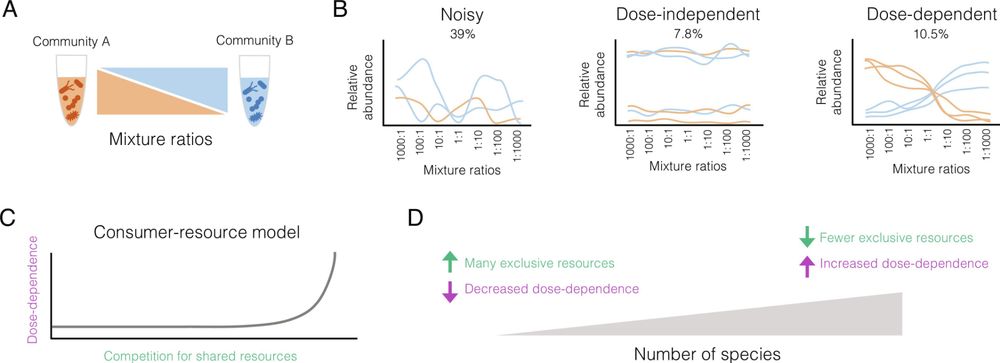I am seeking a postdoc to join my group at UCLA -- ideally the candidate would have some experience in either population genetics or microbes/microbiome (computational background needed). We have a range of projects and are happy to tailer to your interests. Please dm/email me if interested.
12.02.2026 19:18 — 👍 52 🔁 96 💬 1 📌 0

Lab morale got you down? Try a handbook
Documents that lay out a research group’s ethos and practical guidelines are becoming increasingly popular in the academic community.
Scientists across the career spectrum are burnt out, & people are leaving STEM in startling numbers, particularly those from under-represented groups. A lab handbook can foster a more positive research culture. By @scattercushion.bsky.social @nature.com 🧪 www.nature.com/articles/d41...
11.02.2026 17:16 — 👍 14 🔁 8 💬 0 📌 0
Very excited to be going to the Annual Drosophila Research Conference @genetics-gsa.bsky.social in Chicago this March. I think #Dros26 is the hashtag. There is still time for you to register! The fly community is so welcoming and supportive—if you are new to flies please consider going.
04.02.2026 17:15 — 👍 4 🔁 2 💬 0 📌 0

Excellent piece by Matz @heatshok.bsky.social and colleagues discussing the dire status of Caribbean reefs, and potential plans and policies that can be implemented if these reefs are to have any chance. Check it out in PNAS!
30.01.2026 15:43 — 👍 6 🔁 5 💬 1 📌 0
Registration is open for the inaugural GRC conference in the Function of Evolving Systems. Aug 9-14, 2026, Waterville Valley. Truly stellar speaker lineup. Student/postdoc fellowships are available! Please come join us! www.grc.org/function-of-... @joybergelson.bsky.social
29.01.2026 15:03 — 👍 35 🔁 30 💬 1 📌 1
How does the strength of genetic drift evolve over long times?
New preprint out 👇
www.biorxiv.org/content/10.6...
27.01.2026 23:20 — 👍 14 🔁 8 💬 0 📌 0

SpaceBar enables single-cell-resolution clone tracing with imaging-based spatial transcriptomics
Nature Methods - SpaceBar is a cellular barcoding strategy for simultaneous analysis of cell clonal and spatial identities.
Excited that SpaceBar is now out in Nature Methods!🥳
We combined clone tracing with spatial transcriptomics to untangle what drives gene expression in tumors: a cell's identity or its neighborhood?
Most genes were driven by location, but some showed strong clonal patterns.
rdcu.be/eVhpc
18.12.2025 19:55 — 👍 17 🔁 6 💬 1 📌 0
Working on this paper fundamentally changed how I thought about bacterial evolution, and I couldn't ask for a better to Hannukah present than to see it out, at last!
17.12.2025 18:58 — 👍 19 🔁 5 💬 4 📌 0
If you are interested in this work and are looking for a postdoc position, please get in touch -- we are actively looking for someone to join our group at UCLA!
17.12.2025 18:53 — 👍 14 🔁 8 💬 0 📌 0
So excited to share this work led by @alexrob.bsky.social with Ben Kerr!
We investigated a poliovirus capsid inhibitor that exploits a breakdown in the genotype-phenotype map to prevent drug resistance evolution. Or does it?
See Alex's thread, but a few extras:
#socialviruses #evosky #virosky 🧪
10.12.2025 21:07 — 👍 26 🔁 10 💬 1 📌 1
Genuinely one of the most important and interesting papers I have been a part of! Relevant to fundamental questions regarding the predictability of adaptation, as well as the applications of genomic data. Congrats to @j-smiley-rhodes.bsky.social and all co-authors for such a masterpiece!
18.11.2025 15:39 — 👍 7 🔁 1 💬 0 📌 0
Super excited that the bulk of my PhD work is now preprinted! Here we used whole-community competition, or coalescence, experiments to quantify selection acting on genetically diverged strains within larger communities. (1/n)
www.biorxiv.org/content/10.1...
11.11.2025 17:14 — 👍 102 🔁 48 💬 3 📌 2
One week to apply for our fully funded PhD position in Norway! This is a really exciting project in collab. with University of Helsinki and Benchmark Genetics.
Samples are ready - you do (read: learn) everything - functional genomics, bioinformatics, genotype-phenotype associations 🤩
Please RT!
07.10.2025 13:30 — 👍 10 🔁 12 💬 1 📌 0
Human-mediated land-use and climate change occur simultaneously, but how do they interact to shape adaptive dynamics? Super excited to share the first paper from the Kreiner lab, led by postdoc extraordinaire @rpineau.bsky.social
06.10.2025 15:13 — 👍 65 🔁 19 💬 3 📌 1


New preprint led by undergrad Owen Moosman! We uncover extensive haplotype diversity in antifreeze protein gene copy number in polar Zoarcoidei fishes, and report new tools to evaluate assembly uncertainty and switch error in phased genomes www.biorxiv.org/content/10.1...
16.09.2025 17:33 — 👍 2 🔁 1 💬 0 📌 0
Very excited to see this work in press! I think there is a reason to believe that this is a common means of stabilizing large-effect polymorphisms in general and might be an important reason for why diploidy is so common. news.stanford.edu/stories/2025...
15.09.2025 17:24 — 👍 68 🔁 29 💬 1 📌 1
Check out our paper in Evolution Letters!
We used D. melanogaster pigmentation as a focal trait to explore parallelism in phenotypic and genomic responses to environmental change - read more at the link below 👇
31.07.2025 21:32 — 👍 54 🔁 23 💬 2 📌 1
Garud Lab
I am seeking a postdoc for my group at UCLA. We work at the intersection of population genetics x microbiome (garud.eeb.ucla.edu). If interested, please message me!
22.07.2025 17:51 — 👍 85 🔁 100 💬 1 📌 4
Come join us at UCLA!!! We have a growing population genetics community here and Nandita and her lab are outstanding!
23.07.2025 13:46 — 👍 14 🔁 5 💬 0 📌 0

Junior, Assistant, or Associate Specialist – Xue Lab
University of California, Irvine is hiring. Apply now!
The Xue lab at UC Irvine is looking for a staff scientist to support our work investigating how microbes interact and evolve in the gut microbiome! Open to a wide range of previous experience levels, see ad for more.
recruit.ap.uci.edu/JPF09601
17.07.2025 20:32 — 👍 116 🔁 112 💬 0 📌 3
We are recruiting students who are thinking of applying to Biology PhD programs this fall to apply for the Stanford Biology Preview Program. Please spread the word!
27.06.2025 16:52 — 👍 7 🔁 9 💬 1 📌 0
1/n 🧵 Excited to share our new paper! We developed a framework to reveal hidden simplicity in how organisms adapt to different environments, particularly focusing on antibiotic resistance evolution. #EvolutionaryBiology #MachineLearning
15.05.2025 14:33 — 👍 38 🔁 22 💬 1 📌 1

Mixing microbiomes in vitro reveals rules of community assembly | PNAS
Mixing microbiomes in vitro reveals rules of community assembly
Our commentary on the elegant in vitro microbiome coalescence experiments from @goldmandoran.bsky.social @ksxue.bsky.social et al is out.
It was a pleasure to write about one of my favorite microbiome papers of the last few years.
www.pnas.org/doi/10.1073/...
07.04.2025 19:41 — 👍 62 🔁 24 💬 1 📌 3

5 relative abundance plots arranged to have increasing compositional variability (variability across relative abundance samples, here vertical bars)
1/ Hey y'all, I'm excited to share my latest paper, which is out now in PNAS! We introduce FAVA, a statistical framework to measure compositional variability across microbiome samples. If you want to measure variability across a stacked bar plot, FAVA is for you! Paper: doi.org/10.1073/pnas...
14.03.2025 20:46 — 👍 207 🔁 72 💬 5 📌 2
Thank you for the coverage! Excited that this work, in collaboration with @markcbitter.bsky.social and many others, is now out!
20.02.2025 18:11 — 👍 4 🔁 1 💬 0 📌 0
Postdoc at UPenn thinking about mutations, cells, and evolution.
Evolutionary biologist at Academy of Natural Sciences of Drexel U (Philadelphia). Ornithology. Evolutionary genomics. Speciation. Dachshund dad and human dad!
PhD candidate in Dmitri Petrov's lab @ Stanford
Marine evolutionary ecologist 🧬🐟🪸
Can also be found riding motorcycles, camping, or shooting hoops
Teaching Assistant Professor at University of Denver. STEM Educator, evolutionary ecologist, and marine scientist.
Postdoctoral Researcher
Kim Lab @ Princeton EEB
Lecturer and DECRA Fellow at the University of Sydney
Invasion genomics || Wolbachia || Dispersal
https://scholar.google.com.au/citations?user=ipvZJRQAAAAJ&hl
Postdoctoral scholar at UChicago (https://kreinerlab.com/), studying how plants adapt to changing environments and strong selective pressures.
https://rozenn-pineau.github.io/academic-website/
Postdoc @ Stanford | Schmidt Science Fellow ’21 | Biophysics & Evolution | Bayes Theorem Advocate | Proudly Mexicano 🇲🇽
Petrov Lab | Department of Biology | Stanford University
Group Leader at Max Planck Institute for Biology Tübingen @mpi-bio-fml.bsky.social.
EvoDevo, Sex determination, Haplodiploidy 🐜 🐝 🐞 and occasionally, sex chromosomes🐡 🦎
Caribbean, lichens, bikes, beer, rock climbing, coffee, Puerto Rico
Evolutionary geneticist
Adaptation to toxins across environments and timescales
K99 Fellow| Marie Curie Fellow
https://www.mariannakarageorgi.com/
Researcher 🧬 | Musician 🎶 | Lifter 🏋️ | Writer ✍️ | Based in Taiwan 🇹🇼 & Michigan 🇺🇸 | Views my own
Personal account
Evolutionary biologist, senior scientist at CNRS/Sorbonne Université
Interests: origins and control of infectious diseases and conspiracy theories; diversity in science; scientific publishing
https://www.normalesup.org/~fdebarre/
EN & FR
Professor at UC Davis
Work: evolution, ecology, function & phylogenomics of host-microbiome systems; #openscience;
Other: #birds; baseball; T1D
Lab phylogenomics.me
Pics jonathaneisen.smugmug.com
Links linktr.ee/jonathaneisen
TED go.ted.com/6WPm
Viruses, Evolution, Education, Trade Unions, things like that. Prof at Uni of Oxford, NEC member for UCU. Posts mine, reposts not.
Virologist. PI working at but not speaking for USask. Co-EiC of Vaccine. 🇺🇸 in 🇨🇦. Emerging viruses, pathogenesis, zoonosis, host responses, dogs, football, off-color language, transcriptomic chaos. Opinions my own.













